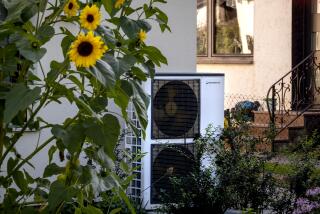Cold? Good thing if you want to lose weight, researchers say
Turn your thermostat down -- and don’t add a sweater. That, researchers report, will not only save energy to heat your home but will use more body energy and perhaps aid weight loss.
Before you get too excited, the scientists are not suggesting the life of a chilly couch potato is the answer to the obesity epidemic. But, they say in the journal Trends in Endocrinology and Metabolism, “We suggest that regular exposure to mild cold may provide a healthy and sustainable alternative strategy for increasing energy expenditure.”
That’s your energy, not the planet’s.
“Obesity is a consequence of positive energy balance,” Wouter van Marken Lichtenbelt of Maastricht University Medical Center in the Netherlands, and colleagues wrote in the journal this week. Tipping that balance can be achieved by eating less and exercising more, as most people already know. But as the researchers note, that’s not working out too well for many people and perhaps it’s time to look at other potential solutions.
Noting that most of us spend most of our time in temperature-controlled indoor spaces, they asked: “What would it mean if we let our bodies work again to control body temperature?”
What they found was that indoor temperatures that are a bit cooler might help us burn more calories. It might take some getting used to. The researchers said that a group of people who spend six hours a day in 59-degree temperatures felt more comfortable and increased calorie-burning brown fat. In young and middle-age people, that heat production -- called nonshivering thermogenesis – can account for a few percent to 30% of the body’s energy budget, the researchers said.
The researchers said in the journal that even though people compensate for colder temperatures by some additional eating, they don’t fully compensate.
“Similarly to exercise training, we advocate temperature training” as part of a healthy lifestyle, they wrote.
“Maximal thermal comfort in the built environment may increase our susceptibility to obesity and related disorders, and in parallel requires high energy use in buildings,” they said.
“Hence, rethinking our indoor climate by allowing ambient temperatures to drift may protect both health and bank account.”
ALSO:
2014 bicycles take big changes for a spinMiddle-aged skateboarders defy family skeptics, and falls
Rocking exercise can bring out-of-control kids to calmer seas
Mary.MacVean@latimes.com







